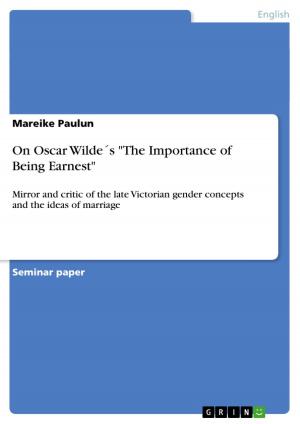Characterisation in Timberlake Wertenbaker's Our Country's Good
Fiction & Literature, Literary Theory & Criticism, British| Author: | Christoph Burger | ISBN: | 9783640240074 |
| Publisher: | GRIN Publishing | Publication: | January 14, 2009 |
| Imprint: | GRIN Publishing | Language: | English |
| Author: | Christoph Burger |
| ISBN: | 9783640240074 |
| Publisher: | GRIN Publishing |
| Publication: | January 14, 2009 |
| Imprint: | GRIN Publishing |
| Language: | English |
Seminar paper from the year 2005 in the subject English Language and Literature Studies - Literature, grade: 1, University of Vienna, 9 entries in the bibliography, language: English, abstract: In this paper I investigate the development of characterisation in the play 'Our Country's Good' by Timberlake Wertenbaker. The term characterisation refers to the way new characters are introduced and created. Throughout my analysis I will propose that a character has a specific trait, which I will back up with empirical evidence such as passages from the book where characters are characterized explicitly. This paper will also be shaped by the following central questions: Which methods are used by what means? What does the author achieve by using these techniques? Which techniques are combined with which characters and why? However, a full discussion of all the characters in the book would go beyond the scope of this paper, since the play includes 22 characters in no more than 91 pages (cf. Wischenbart, 93). This led me to a completely different approach, namely to single out two of the main characters in the play and juxtapose them in terms of characterisation and character development. But before I turn to the full analysis of my central topic, I will clarify the exceedingly important role characterization plays in drama and define the different main concepts and techniques of it. The relevancy and great impact of the process of characterisation to the reader becomes clear when literature on the theory of drama is examined. According to Hoffmann, 'drama depends on the presentation of fictional personalities as the principal vehicle to communicate the message the artists want to convey' (Hoffmann, 1).
Seminar paper from the year 2005 in the subject English Language and Literature Studies - Literature, grade: 1, University of Vienna, 9 entries in the bibliography, language: English, abstract: In this paper I investigate the development of characterisation in the play 'Our Country's Good' by Timberlake Wertenbaker. The term characterisation refers to the way new characters are introduced and created. Throughout my analysis I will propose that a character has a specific trait, which I will back up with empirical evidence such as passages from the book where characters are characterized explicitly. This paper will also be shaped by the following central questions: Which methods are used by what means? What does the author achieve by using these techniques? Which techniques are combined with which characters and why? However, a full discussion of all the characters in the book would go beyond the scope of this paper, since the play includes 22 characters in no more than 91 pages (cf. Wischenbart, 93). This led me to a completely different approach, namely to single out two of the main characters in the play and juxtapose them in terms of characterisation and character development. But before I turn to the full analysis of my central topic, I will clarify the exceedingly important role characterization plays in drama and define the different main concepts and techniques of it. The relevancy and great impact of the process of characterisation to the reader becomes clear when literature on the theory of drama is examined. According to Hoffmann, 'drama depends on the presentation of fictional personalities as the principal vehicle to communicate the message the artists want to convey' (Hoffmann, 1).















